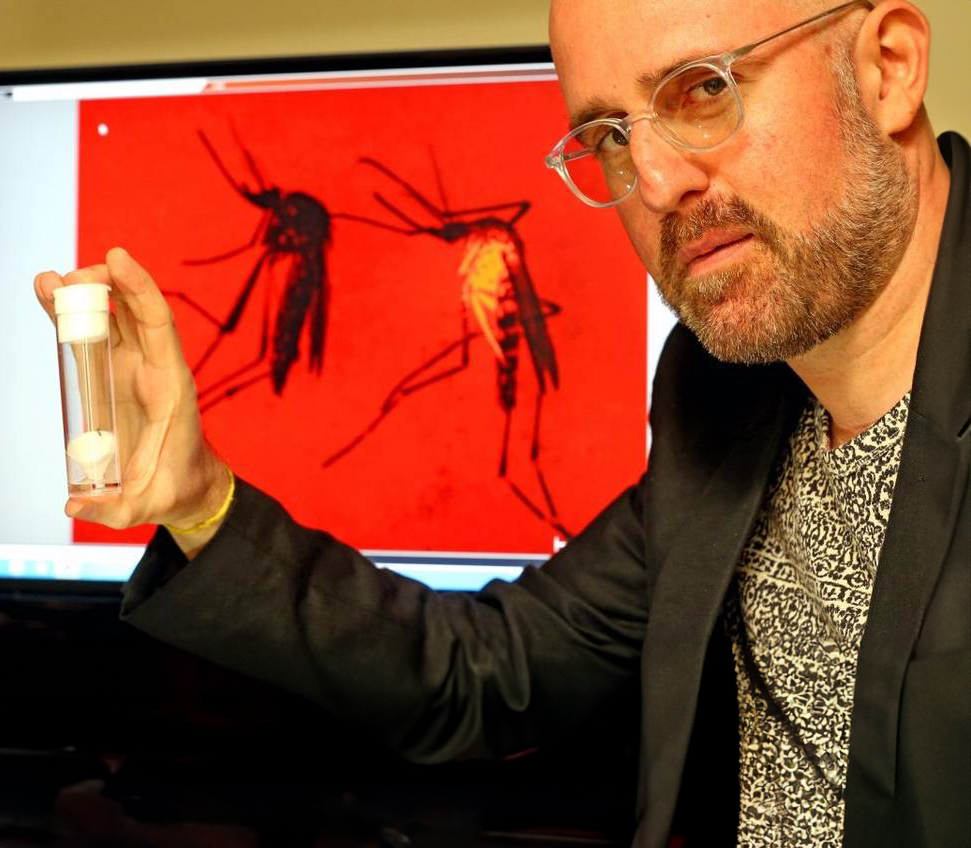
Matthew DeGennaro
Neurogeneticist, First Scientist to make a mutant mosquito
Matthew DeGennaro uses molecular genetics to answer globally critical questions including how do mosquitoes find people and how can we stop the spread of deadly mosquito-borne diseases. His research has revealed new knowledge about mosquito behavior and mosquito control. Dr. DeGennaro, and his non-traditional career path, offers an inspirational narrative of what it means to be a solutions-centered research scientist.
Visit Matthew DeGennaro's research profile
Languages Spoken
English
Suggested Speaker Programs
Stopping the World's Deadliest Animal
Accounting for as many as 725,000 deaths worldwide every year, mosquitoes transmit a variety of infectious diseases including malaria, dengue fever, yellow fever, West Nile virus and Zika. FIU Professor Matthew DeGennaro will share his career-long journey to stop the mosquito's deadly reign. Through molecular genetic research, he is uncovering the mosquito's greatest secrets — how they find us, their preferred breeding ground and what actually repels them.
The Popularity Contest We Don't Want to Win
Mosquitoes are known to prefer some people's blood over others. Neurogeneticist Matthew DeGennero separates fact from fiction and shares how his mutant mosquitoes are the key to revealing how mosquitoes zero in on their preferred meal and what that could mean for a new generation of repellents. Could people someday become invisible to mosquitoes? Dr. DeGennaro believes it's possible.
Frankenskeeter — From Mutants to Scientific Solutions
Matthew DeGennaro is the first scientist to complete a genetic study of mosquito behavior after he successfully made a mutant mosquito in 2013. Since a mosquito won't tell him why they behave the way they do, Dr. DeGennaro makes mosquitoes without certain genes to see how the absence of that gene changes their behavior. He believes this work could lead to a new generation of more effective repellants.
First Gen to Trailblazing Scientist
Matthew DeGennaro was born in the Bronx and grew up in the suburbs of New York. His father was an elevator mechanic and his mother was a legal secretary. Throughout his life, he has carved non-traditional paths to become the first in his family to go to college, find his calling as a research scientist and embark on his quest to end the mosquito's reign as the world's deadliest animal.
In Action
About Dr. Matthew DeGennaro
Dr. Matthew DeGennaro joined the Department of Biological Sciences at FIU in 2014 and is an associate professor. He became the Director of the Biomolecular Sciences Institute in 2023. Dr. DeGennaro seeks to build on the successes of the BSI to foster collaborations that lead to transformational discoveries and build the FIU biomedical research community to nurture the next generation of scientific leaders.
Dr. DeGennaro’s research has been published in high impact journals including Nature, Current Biology, PNAS, Developmental Cell, and Communications Biology. His publications have received more than 3000 citations. Dr. DeGennaro has been an investigator of the CDC sponsored, Southeastern Center of Excellence in Vector-borne Disease since its inception. In collaboration with stakeholders, he helped Miami-Dade County respond to the Zika epidemic. His laboratory continues to work to prevent vector-borne disease in our community.
The focus of Dr. DeGennaro’s research is to understand mosquito behavior to develop new approaches to stop the transmission of vector-borne disease such as dengue, Zika, and chikungunya. Dr. DeGennaro developed genome editing tools in Aedes aegypti for the comprehensive genetic analysis of mosquito behavior. Using this approach, Dr. DeGennaro has provided key insights including the detection of humans by mosquitoes, mechanism of mosquito repellency by DEET, how mosquitoes select oviposition sites, and the physiology of mosquito reproduction. His work has highlighted the role of acid volatiles associated with human odor in mosquito host detection and has led his laboratory to explore how these odors are made by human skin bacteria. Microbes also play an important role in mosquito oviposition site selection. Understanding the composition and odor profiles of the microbial communities associated with human skin and mosquito oviposition sites offers the promise to disrupt vector behavior to reduce disease risk.
Book a speaker
To book this speaker or request more information, please email chcalvo@fiu.edu